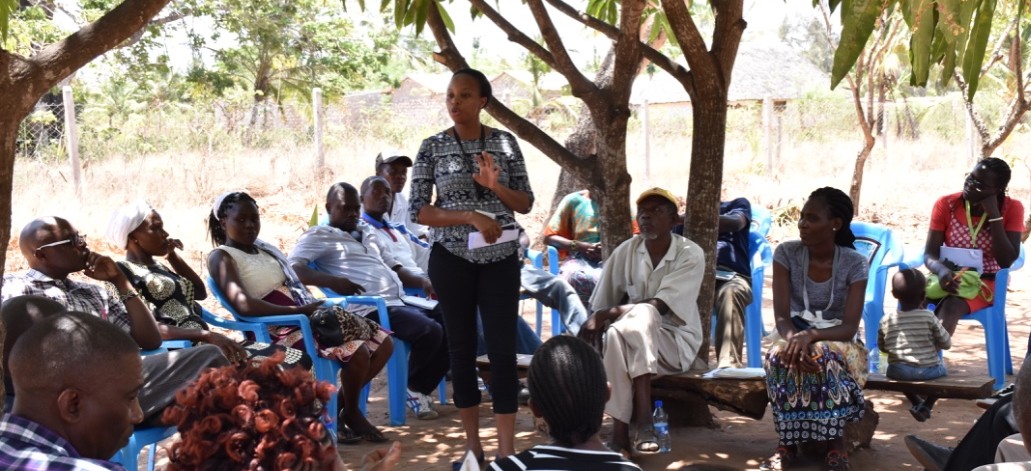
Published: 29 July 2021
Noni Mumba, Head of Engagement at the KEMRI Wellcome Trust Research Programme (KWTRP), writes about how she overcame some of the challenges arising during the COVID-19 pandemic to be able to continue her work connecting with the community.
The ongoing COVID-19 pandemic has thrown ‘a spanner in the works’ so to speak, in that community engagement as we knew it, mostly involving physical close interactions, came to a stop. At the KEMRI Wellcome Trust Research Programme (KWTRP) in Kenya, where I lead a team of talented and very experienced engagement and communication practitioners, our experience was put to the test.
Community and stakeholder engagement is an ethical requirement (CIOMS, 2016) and at KWTRP, together with researchers, communities and stakeholders, we have meticulously developed a strong engagement platform. Despite having a strong strategy, we got into unchartered waters as our traditional engagement approaches could not be easily applied due to COVID-19 restrictions.
Our Open Days, when small groups of roughly 30 people visit for learning tours and interacting with researchers, and other gatherings including open air community meetings, school visits, workshops and meetings with representatives from the Ministry of Health, training and networking events, all had to be halted.
In keeping with the Kenyan Government directives issued in a partial lockdown, all but essential staff were asked to work from home, something which was difficult for my team, considering the nature of our work.
Despite this, we knew that engaging with communities particularly at this time was especially important, as community members were looking for trusted sources of information about the ongoing pandemic and the clinical trials that were starting. We went back to the drawing board, quickly assessed the situation and planned for what was coming.
Establishing new and effective lines of communication
We built on our existing relationships with community members hosting our research and developed new methods of keeping our community engagement work going, albeit at much reduced scope and depth.
Our hybrid community advisory board (CAB) comprises over 200 community members drawn from a health and demographic surveillance system. We consult them on research and operational decisions. The CAB is our link to the community, and we needed to keep an open communication line with them.
We decided to form a WhatsApp group with members of the CAB. However, over half of our CAB members do not own smartphones; so in effect, we were leaving a large group of our key stakeholders out of important discussions about Covid-19 research. We resorted to using online platforms, such as Skype, where people could dial in using older generations of mobile phones.
In this way, we were able to hold over 15 meetings in 2020, with around 160 out of the 200 CAB members.
A balancing act: ensuring safety whilst making sure community engagement continues

Once restrictions were in part eased, some of the paused studies re-started, and our engagement and field staff resumed work.
Whilst this was a welcome move especially from the researchers, the engagement team faced further challenges. Our staff were anxious that they might contract or transmit the virus in the community, despite the strict protocols in place rolled out by the Programme, and the thorough preparedness before any resumption of activities.
How would we keep them safe from infection? Was it ethical to take staff back into the community when wave after wave of Covid-19 continued?
We came to the conclusion that we must continue our work engaging with stakeholders and members of the community.
We planned a series of online meetings where we talked with all our field staff. Based on these discussions, we developed training materials and conducted a series of training sessions, including COVID-19 prevention protocols.
We also made sure they all received Personal Protective Equipment (PPE), so that they felt safe to return to work. We partnered with the Kilifi County Department of Health to train those members of staff who came into close contact with research participants, how to ‘don’ and ‘doff’ PPE gowns.
Building mutual relations with research host communities and gatekeepers remains a crucial element in global health research.
Planning ahead helps to ensure some level of activities continue, however, it’s important to maintain flexibility and make adaptations to engagement approaches as and when needed.
For advice on the ethical considerations when engaging communities in research, read our new guide on the ethical dimensions of community engagement and involvement in global health research.
The KEMRI Wellcome Trust Research Programme is a partnership between the Kenya Medical Research Institute (KEMRI), the Wellcome Trust and the University of Oxford. The Programme has grown from a small group to a facility hosting over 100 research scientists and 700 support staff working across Kenya, Uganda and the region. Noni Mumba is Head of Engagement at KWTRP, supporting research projects across the entire Programme.

